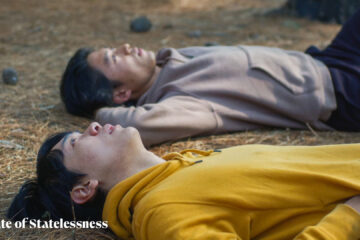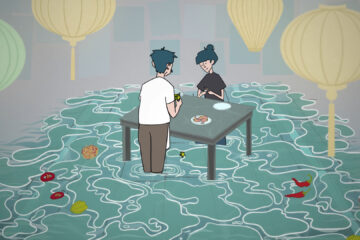Director and writer Mandy Krahn, in this interview, reflects on the personal and cultural roots that shaped her latest short film, Today Is My Day Off (Von 0 auf 180) – a quiet, intimate portrait of a father-daughter relationship and intergenerational understanding, set in motion by the closing of the family bistro. Drawing from her own upbringing and the shared experiences of the Vietnamese-German diaspora, Krahn delves into the nuances of subtle performance, her experimentation with camera movement, and the emotional intimacy found in the simple act of sharing a meal.
Interviewee: Mandy Krahn, director and writer of Today Is My Day Off (Von 0 auf 180)
Interviewer: Jenn Thảo Nguyễn
One of the most striking aspects of your film is its camera movement. Can you share your approach to balancing stillness and dynamism in your storytelling? Did this require choreography or rehearsal?
I love long takes and how the combination of acting and camera movement can create multiple shots within a single move. Alain Resnais’ Hiroshima, Mon Amour (1959) was a big inspiration for me. With this short film, I wanted to experiment with avoiding shot/reverse shot as much as possible – or at least become more conscious of why it’s used in the first place. To make that work, we rehearsed extensively and planned and tested everything in detail beforehand so that it would run smoothly on set.
Your previous film Pleasing Kills (2022) also prominently features scenes set within a restaurant kitchen. What is it about this space that continues to attract your artistic attention?
My parents own a restaurant, and I spent most of my childhood there – playing, sleeping, eating. Restaurants are practically my second home. I also find moments around eating fascinating; so much can hang in the air while, at the same time, it’s incredibly intimate.
The father-daughter relationship at the heart of your film is imbued with nonverbal context. What is your approach to directing these subtleties between actors?
I always work with actors to determine whether a line of dialogue is just the first step toward the real goal or if it is the goal itself – and what needs to happen for them to reach the point where they can actually say it. In real life, I think we often don’t mean exactly what we say, or we circle around something instead of speaking directly. I’m always asking: What are the hurdles here? Why do we make it so hard for ourselves? I stay close to the characters and try to find out what’s blocking them and how they can break free from that blockage.
Despite the film’s commentary on familial relationships, a key aspect is its conversation around gender performance as something passed down. Why was this aspect important for you to convey within your narrative?
You mean the scene where the father criticizes the way she eats and frames it in terms of societal expectations of women? I included that because I wanted to explore the move the father makes when he feels rejected. In this case, he takes out his frustration on her by criticizing her. At the same time, part of his intent is to “protect” her from society’s mockery if she continues eating that way. But it was crucial to me that she pushes back – because, for me, protection doesn’t mean women should constantly have to adapt. Women should decide for themselves how they want to live and eat. Being told how to behave has to stop.
The naming of the restaurant is a reflection of minority existence within German life. What were some challenges and triumphs in capturing this cultural intersection?
I have many Vietnamese friends whose parents run bistros. Our parents are people who have had to fight for survival and their livelihoods. They don’t have the privilege of simply closing shop to spend time with their children. Experiencing that myself and talking about it with others who share that background was hugely valuable.
Equally important in your film is what we don’t see – faces turned away, characters masking the shot. What is one behind-the-scenes aspect that audiences might not notice, but you feel played a significant role in the film’s outcome?
I’ve gotten feedback from people who wished they could have seen more of the characters’ reactions. But if the characters want to hide, then I thought – let them hide. Sometimes it’s okay for the audience to know just as little as the characters themselves. The audience doesn’t always have to know more than they do.
What was your criteria in casting your leading roles, and how did you come to find the actors within this film?
This story is very personal to me. I’m Vietnamese, and it’s about a Vietnamese family. It was important to me that the actors reflect that. I’m drawn to subtle acting, so I look for performers who can – and want to – offer those nuances. In the end, it’s really just instinct.
My research indicates this is your first Vietnamese-driven film. What is one prominent lesson you learned in the process of translating aspects of your identity and experience onto the screen?
I was deeply moved that my Vietnamese friends felt seen when they watched the film. Many cried, and if tears were the only way they could express what they felt, that only reinforces how important it is to tell more Vietnamese stories and perspectives. They matter. We’ve lived through experiences that deserve to be shared. We Vietnamese are more than just “representation”. We’re human beings with emotions and stories, and they’re valid.
Making this film gave me a deeper understanding of my parents and the values they brought from Vietnam. At first, I rejected those values, but now I see they’re a part of who my parents are — and it’s okay that our values are different.
Today Is My Day Off (Von 0 auf 180) will play on Viet Film Fest 2025’s virtual platform in the short film sets “A Place at the Table” (U.S. version) and “Where the Heart Settles” (U.S. version). It will be shown at the in-person screenings of “A Place at the Table” on Saturday, October 11 at 10 AM and “Where the Heart Settles” on Saturday, October 11 at 9:50 PM at the Frida Cinema in Santa Ana, California.


